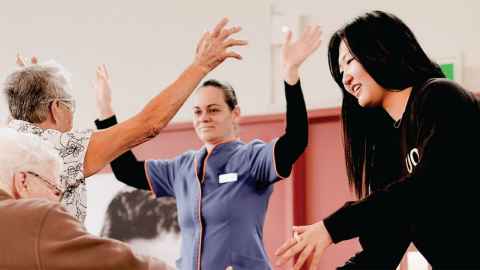Can we heal through creativity?
The creative arts have a positive effect on our health and our satisfaction with life, and can make a powerful contribution to healing processes.

Throughout history creativity has been a refuge and a source of wellbeing. Today there is growing evidence to show that participating in the arts has benefits for mental, emotional and physical health. For instance, art therapy has been found to help war veterans experiencing post traumatic stress disorder after returning from Iraq and Afghanistan. Music therapy can sooth pre-term babies, reduce the need for sedatives during invasive medical procedures or help stroke sufferers regain their speech. Dance is used by cancer patients to improve strength and mobility, and to deal with pain and loss.
Dance Studies is already having a powerful impact on our communities. For example, in the aftermath of the 2011 Christchurch earthquake, we ran dance classes with school children to help them recover and build resilience.
In Dance Studies our students work with children with special needs at the Pegasus Unit at Pakuranga High School, dance alongside adolescents at Starship Children’s Hospital, and run workshops with the elderly in Selwyn Village Retirement Home. The benefits of dance to health and wellbeing are studied as an integral part of our undergraduate degree.
Doctoral students are investigating educational and healing qualities of dance. One study explores the effects of Poi and Tai Chi on physical function in healthy older adults working in partnership with a member of the University’s Centre for Brain Research. The possibility of using Poi as a rehabilitation tool for stroke patients has huge scope for supporting Māori men and women.
In 2014, a pilot project was launched to investigate the positive effect of dance activity for people with dementia – more than 40,000 New Zealanders, and more than 24 million around the globe. Now the study is expanding and a researcher will establish dance feasibility trials with dementia patients and those with mild cognitive impairment. It will look at how dance can be used to slow down the onset and progression of dementia, and at how to build robust measures that show the impact of dance activities on patients.
I would have expected for the residents to be exhausted after 30 minutes, but it was clear that they were really enjoying the session and they remained focused for more than two hours, which is something that we have never seen before
Our communities are already benefitting from the power of dance to connect people with themselves, with each other, and with their environment. Our academic staff and masters and doctoral students are investigating how we can gain deeper understanding and evidence of the ways in which dance can transform lives. To build on our work we need to continue to attract research students from New Zealand and around the world through enhancing our postgraduate scholarship programme.
Find out more
To find out more about how you can help, Nicky Pridham.
Nicky Pridham, Development Manager
EMAIL: nicky.pridham@auckland.ac.nz